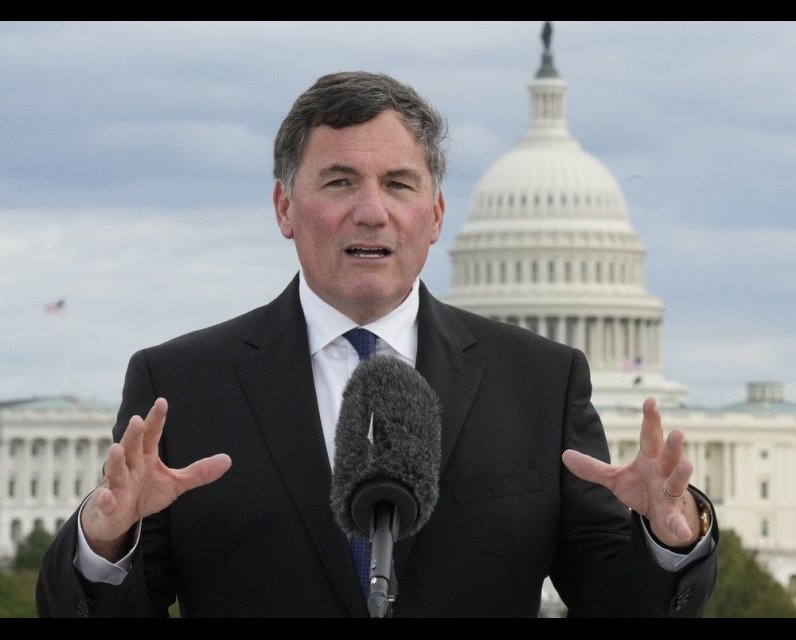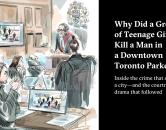Dominic LeBlanc is hoping his next comeback includes a U.S. trade deal

OTTAWA — Dominic LeBlanc beat cancer.
Now, just five years later, Canada’s minister for Canada-U.S. trade is battling another malignant threat: U.S. President Donald Trump’s tariffs.
LeBlanc, the Carney government’s minister of just about everything, has spent much of this week in Washington, D.C. as the lead cabinet minister trying to navigate the choppy and unpredictable waters of the Trump administration’s trade policies.
In many ways, LeBlanc was an extreme long shot to be in this position as the cabinet’s point person tasked with one of the country’s most important challenges in decades. Known more for his charm, institutional knowledge and political skills than as a policy wonk or a details guy, LeBlanc was forced to step away from his role in former prime minister Justin Trudeau’s cabinet in 2019 while battling a rare form of non-Hodgkin’s lymphoma. He was told that he had about an 80 per cent chance of survival, but was given no guarantees.
At the start of this year, with his health now in check, his Liberal government also stared down its own mortality. With opinion polls showing a deficit of as much as 25 percentage points, the incumbents looked certain to flatline, instead of claiming the fourth consecutive mandate that they later won.
Then in April, LeBlanc survived another major challenge. Perhaps more closely linked personally with the unpopular outgoing prime minister than anybody in cabinet — he even babysat decades earlier Trudeau and his brothers — LeBlanc seemed like a strong candidate to be sacrificed as Carney put his own stamp on the Liberal cabinet.
Instead, LeBlanc was tasked with Canada’s bid — along with Carney and others — to land a critical trade deal with the mercurial, tariff-loving U.S. president.
Personal rapport helps with any negotiation or business deal, said Jamie Tronnes, executive director of the U.S.-based office of the Canadian think tank the Macdonald-Laurier Institute, but especially with this White House. LeBlanc is seen as a “disarming” person who has at times been able to reduce the tension during discussions with the U.S., Tronnes said.
“I think the Trump team has a rapport with Dominic LeBlanc,” said Tronnes.
The opposite appears to have been the case during U.S.-Canada free-trade negotiations during the first Trump administration. The president made it very clear that he didn’t like either Trudeau or former foreign affairs minister Chrystia Freeland.
Trump later called Freeland “a whack,” “totally toxic” and “not at all conducive to making deals.”
A good rapport can help seal a deal, but in this case, Tronnes added, it may also have been important in helping the Canadians work out what the Americans even wanted in a trade deal with Canada. A few months ago, she said, Canadian negotiators seemed unclear on that point. “Now, I think they know what they need to do.”
For LeBlanc, there’s clearly no shortage these days of things to do.
As he prepared to make an appearance earlier this month before the Senate Committee on Foreign Affairs and International Trade, Sen. Peter Boehm, the committee’s chair, kidded LeBlanc about how long it took to include the list of his various cabinet jobs in the introduction: minister of internal trade; president of the King’s Privy Council for Canada; minister responsible for Canada-U.S. trade; minister responsible for intergovernmental affairs and One Canadian Economy.
LeBlanc is “living the dream” as a prominent cabinet minister with critical files, says Tony Clement, a former cabinet minister in Stephen Harper’s government and a friend of LeBlanc’s going back to their undergraduate days at the University of Toronto. “He’s thriving — he’s a key component of that government.”
“He’s Mr. Fix-It,” said Clement.
The Beauséjour, N.B. MP has clearly beaten the odds on a number of fronts. LeBlanc’s steady climb to the top of Ottawa’s political hill has left the 25-year parliamentary veteran as the minister responsible for today’s most important issue – and a number of other files. The unwritten hierarchy of a cabinet can change in a flash, but LeBlanc is now arguably the second most powerful member of the Carney government.
Scott Reid, a former Liberal adviser who has known LeBlanc since the late 1980s, described him as Carney’s one “indispensable” minister because of his wide range of skills and “the centrality of the Canada-U.S. file.”
LeBlanc is well aware of his good fortune.
“If I think where I was myself five or six years ago just in terms of health, or where we were politically a year ago, I feel super lucky to have the job I have now,” LeBlanc told National Post following a recent appearance before a Senate committee. “It’s super interesting and I hope I can make a contribution.”
When asked the inevitable question about whether his battle with cancer has changed him or his perspective on work, LeBlanc, now 57, says he doesn’t think so, other than a renewed sense of urgency that goes with being a cancer survivor.
“It sort of makes you not want to miss one day or one week of something that you appreciate and enjoy.”
Politics is in the familyLike his friend and future boss, Justin Trudeau, LeBlanc was born in Ottawa to a political family. A Liberal family.
The future cabinet minister came into the world on the same day in December 1967 that former prime minister Lester Pearson announced his resignation. His father Romeo was a cabinet minister under Pierre Trudeau, and later became Canada’s first governor general from the Maritimes and of Acadian heritage. His mother, Joslyn, was close with Margaret Trudeau, Justin’s mother.
After completing high school in Ottawa, Dominic LeBlanc earned a Bachelor of Arts degree in political science from the University of Toronto, before a law degree at the University of New Brunswick, and a few years later, a Master of Laws degree from Harvard University.
Friends from his undergraduate days at the University of Toronto say LeBlanc hasn’t changed much over the last few decades. He was, like now, charming, pragmatic, well-connected, and extremely funny.
“He’s an amusing guy to spend time with,” said Karl Littler, a former Liberal adviser who has known LeBlanc since their university days.
Clement, who also met LeBlanc while both were politically active undergrads, said he remembers fondly his friend joking that his family had won the “Lotto 649 of appointments” when his dad was named Canada’s governor general.
Reid said LeBlanc can be underestimated because he’s so charming and funny, but that quick wit doesn’t mean he isn’t also very quick in absorbing a briefing or a file. “He has a fast download speed.”
LeBlanc, said Reid, has a rare combination of elite political skills, including an ability to speak about complicated policies in plain language without a script.
“He’s the class clown but he’s also the class president,” said Reid. “He’s one of the most interesting people I’ve ever known.”
After finishing his studies, LeBlanc worked briefly as a lawyer with Clark Drummie in Shediac and Moncton, N.B., before moving back to Ottawa where he soon followed his father’s footsteps into the world of politics.
Sen. John McNair, who worked closely with LeBlanc at Clark Drummie while McNair was articling, said the future minister showed many of the same skills as a young lawyer that he has since used as a politician, including an ability to see pragmatic solutions.
In 1993, LeBlanc landed a job on Parliament Hill working for Prime Minister Jean Chrétien, staying for three years.
In 1997, LeBlanc made his first foray into electoral politics, running for MP in the Beauséjour riding that he now holds. In that first attempt, however, he lost to New Democrat Angela Vautour before winning in 2000 and in eight subsequent elections.
Now seen as a fine practitioner of retail politics, LeBlanc spent the next few years rising the ranks of the Liberal caucus, becoming a parliamentary secretary in 2004 and taking a brief run at the party’s leadership in 2008 before dropping out to endorse eventual winner Michael Ignatieff. In 2015, he entered cabinet as the Trudeau government’s house leader. In the ensuing years, he held a wide range of roles, including cabinet posts at Public Safety, Fisheries and Oceans, Northern Affairs, and, briefly, Finance.
A number of LeBlanc’s key posts in government, such as leading the Liberal caucus, inter-governmental affairs or, like today, Canada-U.S. trade, have often called for somebody with great people skills and an ability to see others’ perspectives. That’s no different, Reid said, from LeBlanc’s current role on Canada-U.S. trade and a key interlocutor with the U.S. Commerce Secretary Howard Lutnick.
“He draws people,” Reid said of LeBlanc. “He’s incredibly likeable.”
A comeback story that almost never happenedAfter his cancer diagnosis, LeBlanc was told that he would need “very aggressive” chemotherapies and a stem cell donation via an allogeneic transplant — obtaining healthy stem cells from a donor who is not identical to the recipient.
Fortunately for LeBlanc, DKMS, the German-based international blood science organization, was able to pair him with a donor. Jonathan Kehl, a then-20-year-old from the Hesse state town of Bad Hersfeld, had registered as a potential donor while still in high school two years earlier.
After medical staff made the connection between LeBlanc and the young man “who saved my life,” LeBlanc has said that it took doctors a few weeks to figure out the right blend of chemotherapy drugs to get his cancer into remission. He was then referred to Maisonneuve-Rosemont Hospital in Montreal.
Since then, Kehl and LeBlanc have spent time together in both Canada, where they went salmon fishing in New Brunswick, and in two years ago in Germany, where the Canadian politician and his wife, Jolène Richard, a former provincial court judge, met the Kehl family.
“He and I have a special bond,” LeBlanc posted on social media at the time. “Indeed, we have the exact same blood and immune system. Because three and a half years ago, he answered the call to donate some of his stem cells to a man whom he knew was very sick, but whose identity was not known to him at the time.”
LeBlanc said earlier this month that he and Kehl stay in touch through texts and video calls and that he hopes to visit the recent university graduate again in Germany. “It’s just a beautiful story.”
As he took a moment to reflect on his journey over the last few years, LeBlanc also still shows great appreciation for Trudeau’s decision to keep his cabinet seat warm while he was fighting the disease. It helped with the mental side of his recovery, LeBlanc said, to be able to look forward to regaining that part of his life.
Trump’s tariffs loom largeBut today, his big battle is in Washington — and the stakes couldn’t be much higher for the Canadian economy.
During his recent Senate committee appearance, LeBlanc emphasized that a deal with the U.S. is certainly possible but that Canadians need to accept that the trade relationship between the two neighbours isn’t going back to the way it used to be any time soon.
“I do believe this is resolvable,” LeBlanc told the Senate Committee on Foreign Affairs and International Trade. “(But) the relationship with the United States has fundamentally changed and it will not magically go back to what it may have been a year ago or 25 years ago.
Canada’s economy has been increasingly struggling in recent months since Trump imposed tariffs on a wide range of critical Canadian exports, including core industries such as steel, aluminum, autos and softwood lumber. The government’s own Export Development Canada unveiled a report this week that forecast that Canada will be in a recession by the end of the calendar year.
LeBlanc said later that Canada has a two-track strategy in being open to either sectoral deals for industries such as steel, aluminum or softwood lumber, or a broader deal. He wouldn’t say which he thinks is more likely to occur. “Both tracks are still in discussions.”
With the greatest battle of his personal life to date in the rear-view mirror, LeBlanc is now a frequent flyer between Ottawa and Washington, taking on the greatest battle of his political life.
Canadians are hoping for a similar outcome.
National Post
Our website is the place for the latest breaking news, exclusive scoops, longreads and provocative commentary. Please bookmark nationalpost.com and sign up for our daily newsletter, Posted, here.



Comments
Be the first to comment